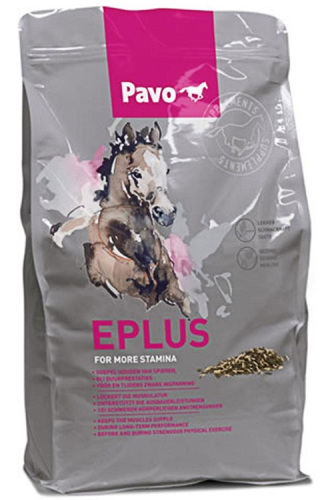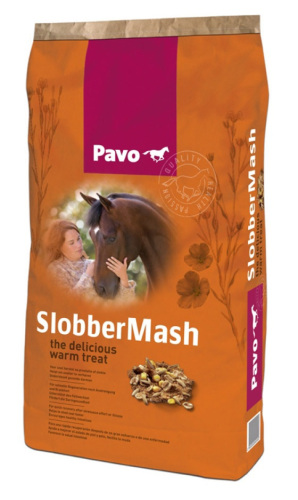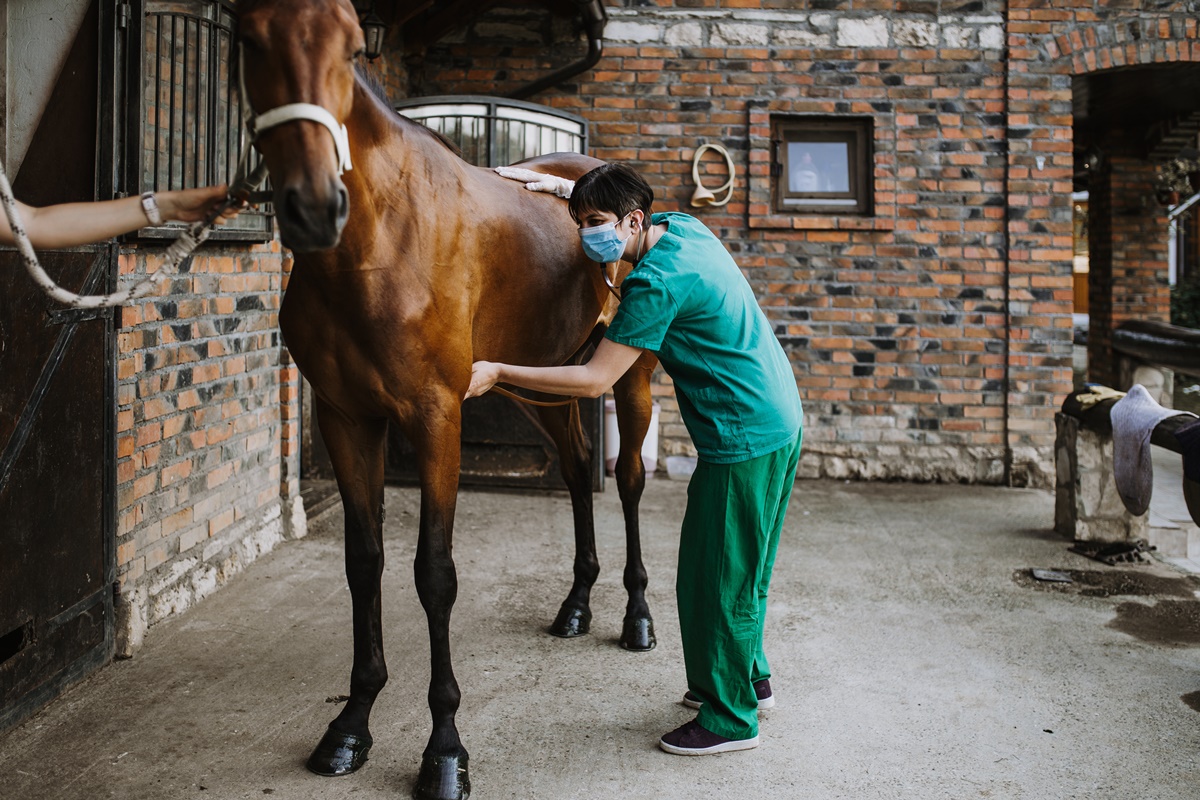
Horses have a sensitive digestive system that is prone to various disorders such as colic. Every horse owner should know the risk factors for colic. Being aware of those factors, symptoms, and emergency care is crucial for helping a suffering horse.
What is colic in horses?
Colic is a set of symptoms indicating pain in the abdominal organs, most often caused by gastrointestinal disorders. This includes all stomach, intestines, reproductive and urinary tract conditions that cause pain. Every colic is a direct threat to the horse’s life and requires immediate veterinary intervention. Colic is quite common among horses; the most important thing is to provide your horse with an adequate diet and observe the animal.
What are the causes of colic?
There are various causes of colic. Some horses have a genetic predisposition to colic. They require extra care and observation. Signs of colic might differ depending on the type of the condition. That’s why it’s beneficial to know about all the risk factors for colic. A knowledgeable owner not only can use effective preventive measures but also act quickly and adequately when helping a suffering horse.
One of the most common causes of colic is a sudden diet change. The sensitive and delicate equine digestive system is not adapted to drastic dietary changes; that’s why they can cause severe stomach aches. Colic can also be caused by eating too hungrily and quickly or by consumption of something that shouldn’t be eaten by a horse. A big factor that increases horses’ susceptibility to colic is the lack of gag reflex. In case of consumption of a toxic plant or spoiled feed, a horse won’t be able to vomit it out.
Another possible cause of colic might be a too short time gap between physical exercise and meals. Every type of exercise should be followed by at least a 45-minute break before feeding a horse. Similarly, letting a hot and sweaty horse drink cold water can lead to colic. So, a horse’s training schedule should give it enough rest time before a meal.
Horses have a natural susceptibility to digestive disorders due to the microflora and features of their digestive system as well as the anatomy of their internal organs. Because equine’s large intestine is not attached to the abdomen, it is susceptible to twisting – a condition that requires surgical intervention. Additionally, pregnant mares have a higher colic risk, because gestation causes shifts in the organ placement.
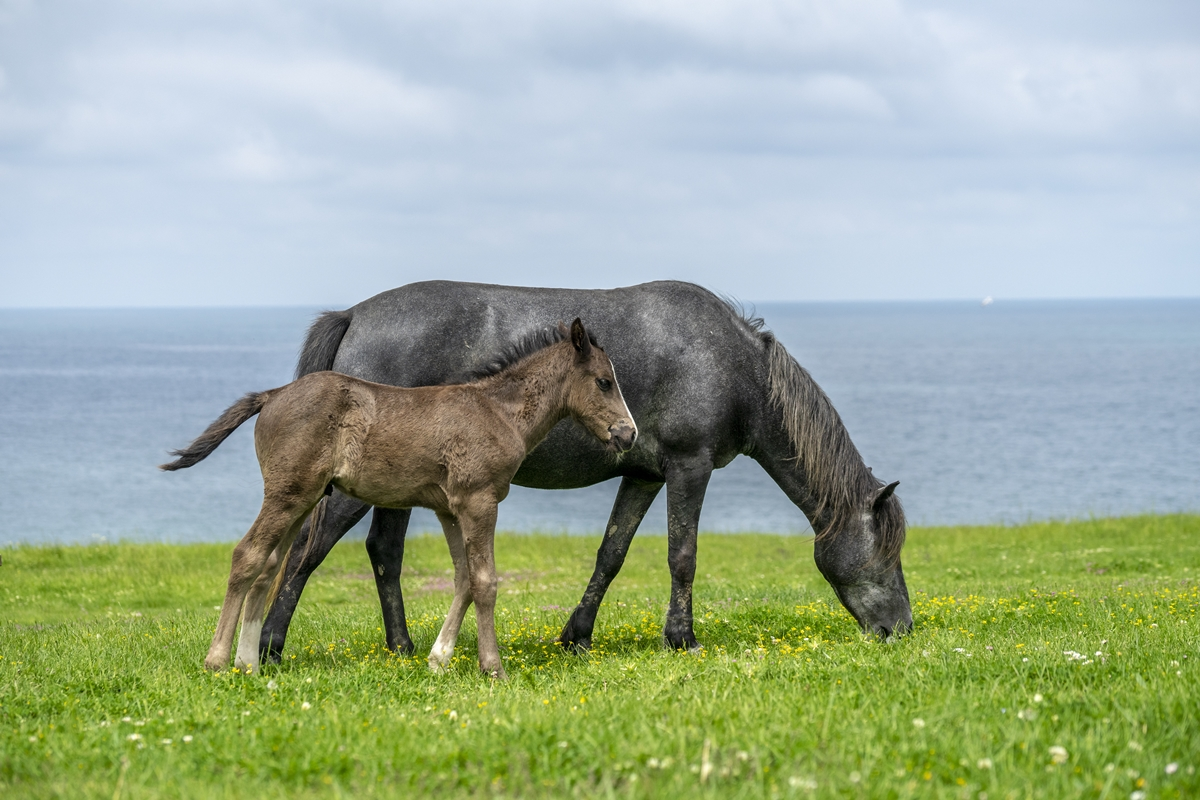
Colic is also more common in horses with gastric ulcers. Gastric and duodenal pain is caused by irritation of the damaged lining by hydrochloric acid. If the condition progresses, colic symptoms might become more severe, even though previously they were mild and not noticeable to the owner. Drugs prescribed by a veterinarian won’t directly prevent a colic. Irritation of the gastrointestinal tract can also occur as a result of long-term administration of nonsteroidal anti-inflammatory drugs. It’s also crucial to do regular check-ups of the horse’s teeth, as the sharp teeth edges hinder food intake, which could result in digestive problems.
Another important risk factor of colic is stress. Typically, stress occurs due to inadequate horse husbandry, transportation, or environmental changes. Failure to meet the basic needs of a horse, such as contact with other horses, round-the-clock access to food and water as well as daily turnout, might result in the above-mentioned gastric ulcers. Horses can also colic due to long and stressful journeys, competitions, or simple environmental changes.
Colic can be also caused by the neglect of the regular deworming schedule of the horse. Parasites might cause numerous health problems including colic, by obstructing or damaging the intestine. In case of doubts, it’s best to consult a vet that will create a detailed deworming schedule for your horse. It’s also important to note that keeping a stable clean prevents the spread of parasite eggs and infection of other horses.
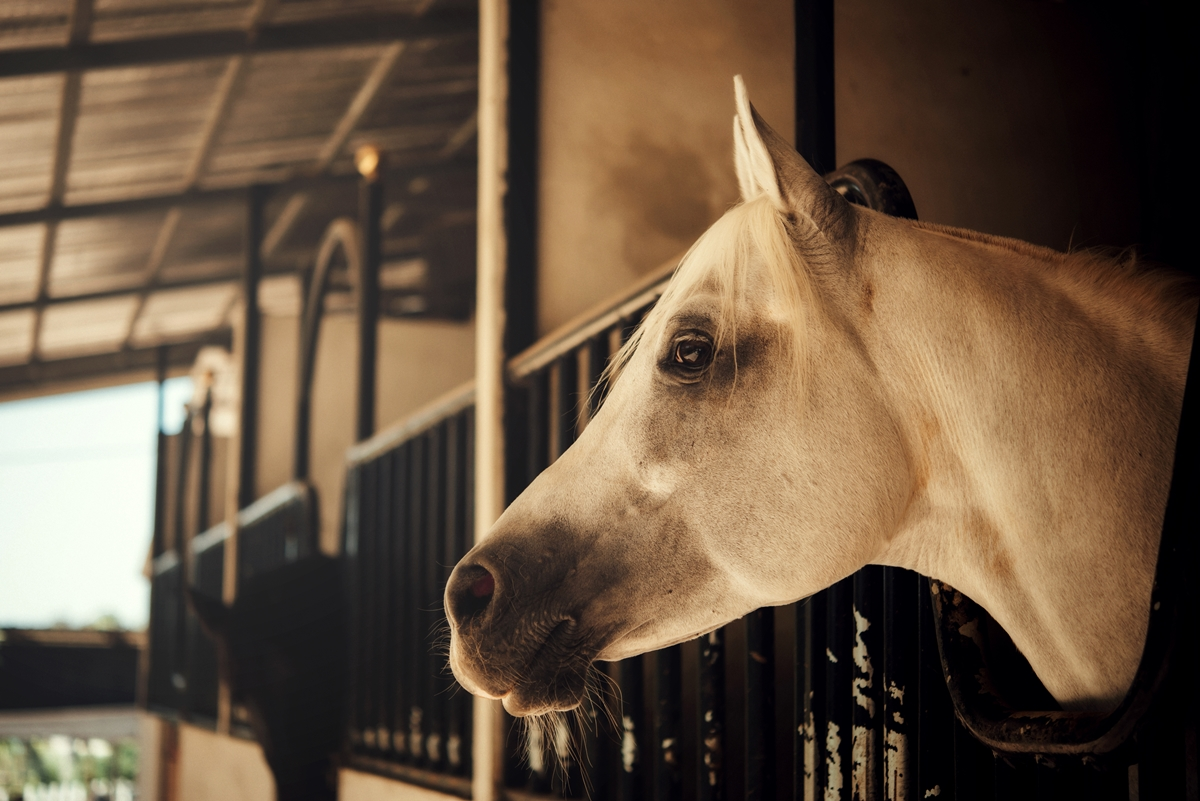
Types of horse colic
There are many types of colic that differ in symptoms and causes. The most common ones are:
1. Spasmodic colic
It is one of the most common types of colic that affects the stomach and intestine. During this type of colic, a horse experiences mild or medium-intensity pain symptoms caused by spasms. Usually, it passes after administration of painkillers and anti-spasmodic drugs. In some cases of spasmodic colic, displacement may occur, which requires surgical intervention. The surgery will be performed immediately after the horse arrives at the clinic.
There are many causes of spasmodic colic but sensitive, prone to stress, immunocompromised horses, or those with ulcers are especially susceptible. Spasmodic colic might also be caused by a hot horse drinking cold water, pouring cold water over a horse, or general weakness, as well as the presence of internal parasites.
2. Impaction colic
This is another common type of colic that usually affects the colon. Most often, it occurs as a result of intestinal stenosis in areas where the colon changes direction or diameter. It can be a consequence of spasmodic colic. The obstruction of the colon might also be caused by parasites, consumption of stodgy food, or lack of constant access to water and forage.
Additionally, problems with the horse’s teeth might lead to inadequate chewing of the food. Undigested and blocked food in the equine’s digestive system causes immense amounts of pain and can’t be removed by the body. The most common treatment method is administrating laxatives, usually either a paraffin or vegetable oil, through a tube put directly into the digestive system.
3. Gas colic
The accumulation of gas in the digestive system can lead to gas colic. It is most often caused by an excess of easily fermentable foods in the horse's diet, such as apples or clover. However, it can also be caused by lack of exercise, abrupt changes in diet, excess of concentrate feed, dental problems, and feeding moldy hay or steamed grass.
Due to the increasing volume of gas caused by bacterial fermentation in the digestive tract, the intestinal walls get stretched. The abdomen is visibly larger, while the distended colon is palpable during a rectal exam. Gas flowing into the stomach can also cause it to dilate. The treatment includes painkillers and hand-in walking. If symptoms persist, surgery may be necessary, as gas colic can lead to twisting of the gut.
4. Stomach distention
The distention of the stomach can occur if a horse consumes fast fermenting feed (such as apples, bread, or clover) or feed that expands (such as dry beet pulp or wheat bran). It can also be caused by inaccurate chewing of food or hungrily eating. The increasing volume of the stomach presses on the diaphragm and in consequence makes breathing more difficult. Horses often sit in a dog-like position because it eases their breathing.
Fermented food then moves into the intestines and can lead to obstruction or even twisting. The onset and severity of symptoms are quick and intense. The veterinarian's intervention is necessary due to the risk of stomach rapture – a fatal condition. The most common treatment includes administering painkillers, anti-spasmodic drugs, and inserting a tube with laxatives.
5. Enteritis
It can be caused by a parasitic infection that damages the intestinal lining and leads to toxemia which is the circulation of bacterial toxins in the blood. The presence of parasites can disrupt the blood flow to the intestine. Other possible causes are sand ingestion, allergies, fungal infections, ECoV coronavirus infection, and other idiopathic diseases. The main symptoms are severe pain and diarrhea.
6. Urinary tract colic
This is quite a rare type of colic. The main characteristic symptom is frequent urination in small amounts, sometimes with an admixture of pus or blood. Sometimes a horse will develop a fever. This colic can be caused by a few things; however, it most often occurs due to urethritis, nephrolithiasis, rupture, or paralysis of the bladder.
7. Kidney colic
This is a set of symptoms accompanying kidney failure. It can occur as a consequence of another colic, sepsis, leaky gut syndrome, hemorrhage, and after administrating certain types of medications. In the case of kidney colic, it is necessary to start the recommended treatment by a vet immediately as it can lead to kidney necrosis.
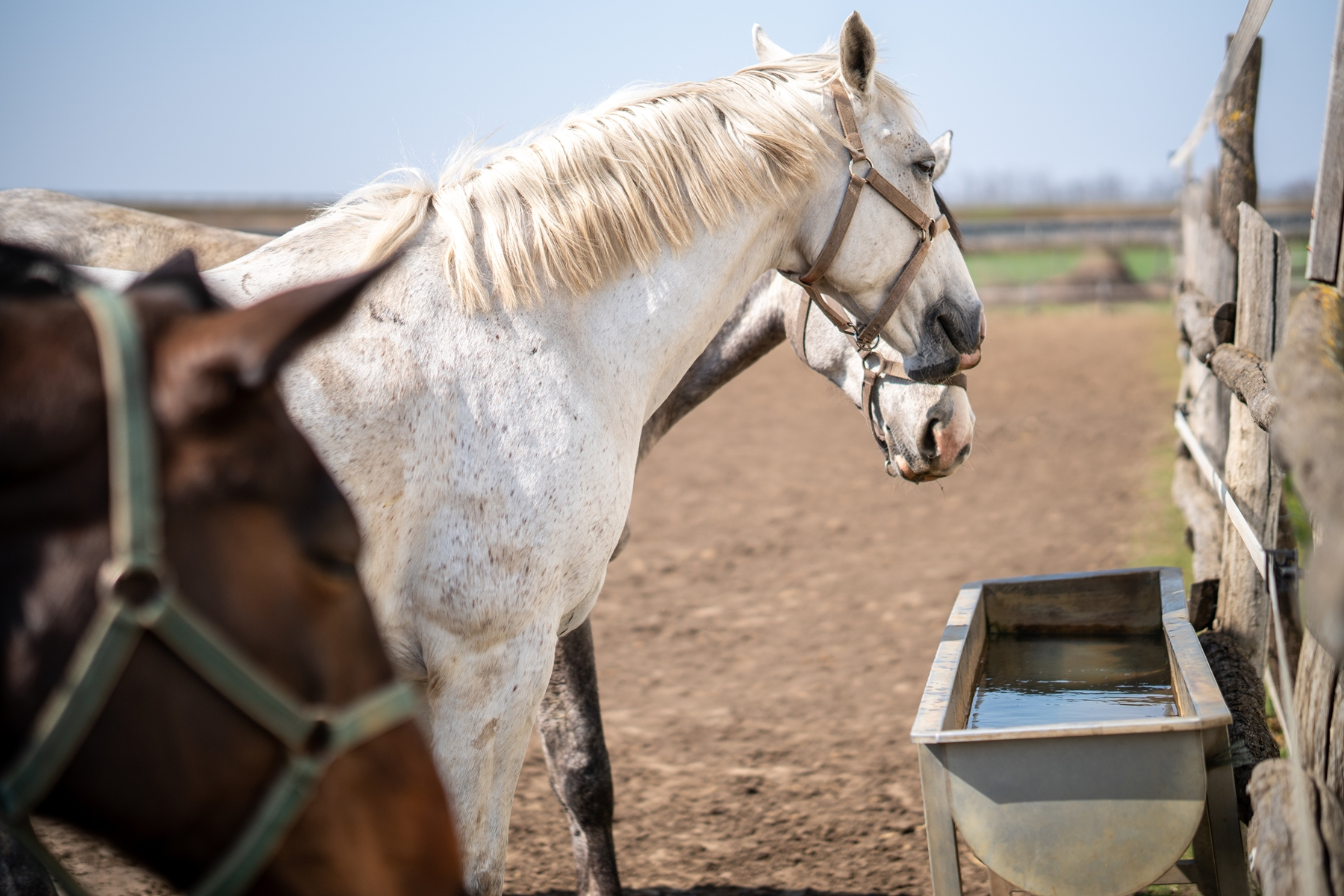
What are the symptoms of colic?
The symptoms vary among different types of colic. The most common symptoms include:
lack of appetite and thirst
apathy
increased sweating
assuming relief positions (position resembling an attempt to urinate or sitting)
rolling or lying down
diarrhea, small size of feces, or complete lack of defecation
noticeable restlessness, nervousness
kicking in the side or abdominal area of the horse
turning the head/looking sideways
pulse measurement above 45 beats per minute
accelerated breathing
redness or yellowing of the conjunctiva
enlargement of the abdominal girth, bloating
lack of audible bowel sounds in the horse's abdominal area.
Differential diagnosis of gastrointestinal colic
In the case of suspected gastrointestinal colic, neurological disorders should be considered. The differential diagnosis should also include checking for urinary tract diseases, such as urinary tract obstruction. Other possible causes worth considering are cancer and diseases of the reproductive system, such as torsion and acute uterine inflammation or ovarian soreness associated with the preovulatory period.
What to do in case of colic?
If you notice signs of colic, immediately contact your veterinarian in order to help the sick animal as soon as possible. During the phone call, you should describe the noticed colic symptoms and the circumstances of its appearance; follow the vet’s recommendations. Until their arrival, monitor the horse's heart rate, temperature, respiratory rate, and gum color.
Additionally, you should hand-walk your horse and prevent it from rolling as it can cause twisting of the gut. If permitted by the veterinarian, you can delicately massage the horse’s abdomen or use other relaxation techniques. You shouldn’t give your horse anything to eat, but drinking water is allowed.
Treatment
Every colic poses a threat to the horse’s life. The treatment depends on the type of colic. Due to the large number of possible causes of micturition, the details of treatment are determined only after the veterinarian examines the situation. The priority is to assess the threat to the animal's life. Most often, anti-spasmodic and anti-inflammatory drugs are administered; probing is performed in cases of obstruction.
Sometimes surgical intervention is necessary; it is one of the most successful types of treatment. Due to this fact, it might be a good idea to familiarize yourself with clinics that offer this kind of treatment. Statistically, in 90% of cases, horses with acute intestinal obstruction survive surgery when surgical treatment is implemented up to 6 hours after the onset of acute colic symptoms. Each additional hour reduces the horse's chances of survival by about 10%.
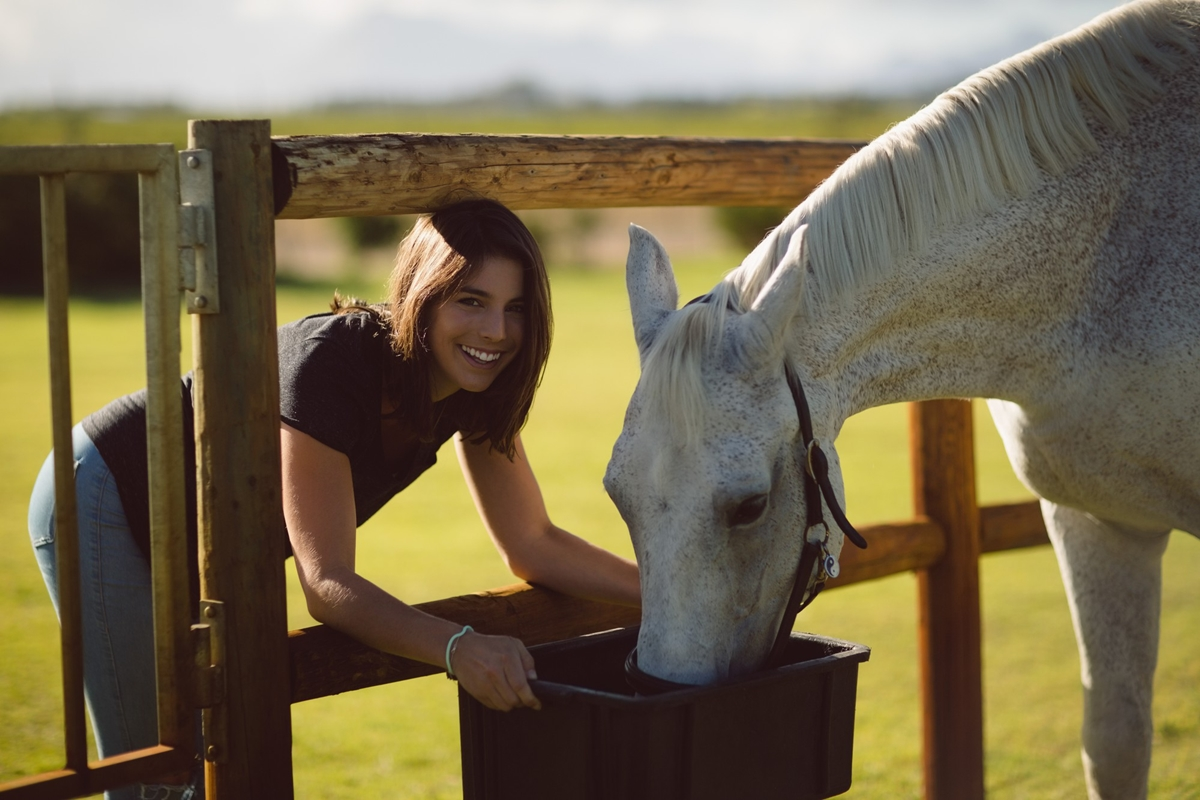
Prevention
The basis for preventing colic in horses is proper care and providing them with the right living conditions. Any horse should have around-the-clock access to good-quality food and fresh water. It’s best to place the hay in different places around the field as this will encourage horses to move and resemble their natural environment. Additionally, horses should have daily turnout that will allow them to move freely and have contact with other horses.
Members of the herd should be carefully selected based on their temperament because any grievances among horses might lead to fights and immense stress. Lack of access to food results in the accumulation of hydrochloric acid in the stomach, which can ultimately cause ulcers. A horse without free access to food might also eat more hungrily during feeding times. This behavior causes an accumulation of large amounts of gas in the digestive system and carelessly chewed feed can lead to intestinal obstruction.
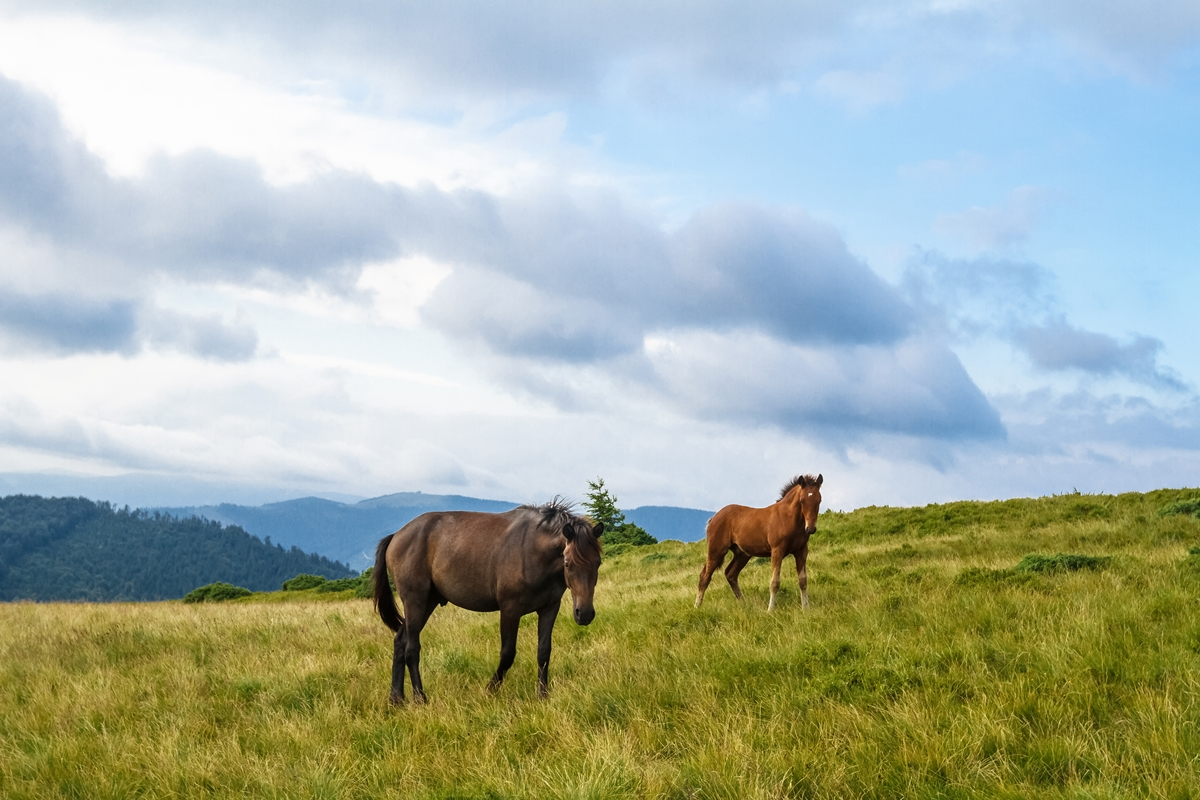
Important preventive tactics include setting up a concentrate feed schedule, feeding the right amounts of it, and creating a training schedule. In case of bad weather conditions, you can put a blanket on a horse and the time spent outside can be shortened, but it is still recommended to maintain a daily routine. A horse should never be left alone in the stable while the rest of the herd is outside. Such situations put the animal under great stress and mental discomfort.
Horses that are kept outside at all times should have access to spacious shelters that will act as a form of protection from wind and rain. Weakened horses in need of recuperation should be provided with a resting place that allows them to feel calm and safe. It is also crucial to keep up with the deworming schedule and use adequate medicine for it. Horse teeth should be regularly checked by a specialist. In spring and autumn, it is recommended to regularly clear the sand from the horse’s gut with psyllium husk.
*Every dietary change and unusual or worrisome behavior of the horse should first be consulted with a veterinarian.
News from the Equishop equestrian store:









